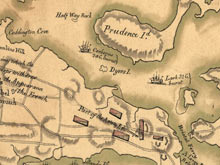The Final Fate of the Cerberus
Boston 1775 has periodically passed on news about the final resting-place of some Royal Navy ships notable in the Revolution:
H.M.S. Cerberus famously arrived in Boston in May 1775 carrying three generals to assist Gov. Thomas Gage: William Howe, John Burgoyne, and Henry Clinton. A frigate named after a mythological three-headed monster could hardly have been a better gift for Patriot propagandists.
(The Earl of Sandwich, frequent First Lord of the Admiralty, liked naming warships after figures from classical mythology. Though he wasn’t in that office in 1758 when the Cerberus was launched, his preference had taken hold.)
The Cerberus was involved in the fight over Noddle’s Island and the Battle of Bunker Hill before returning to Britain with news of that disastrous victory. By the end of the year the warship was back along the American coast, patrolling east of New York’s Long Island. It helped the British military take over Newport in December 1776.
On 14 Aug 1777, the submarine inventor David Bushnell targeted the Cerberus off New London, Connecticut, with another invention: the floating mine. However, some of the warship’s sailors spotted one of Bushnell’s explosive barrels and hauled it aboard their boat. The device went off, killing three and wounding one.
In July 1778 H.M.S. Cerberus was back in Narragansett Bay when the first French fleet arrived. After several days of maneuvering, on 5 August it and three other frigates were chased down by two much larger French warships. The British captains chose to run their vessels aground and set them on fire rather than let them be captured.
In the 1970s a graduate student in archeology discovered the wreck of the Cerberus off Prudence Island. Very little of the frigate was left. That site is now protected by federal law.
- H.M.S. Somerset, which guarded the Charles River as Paul Revere was rowed past and fired the first shots of the Battle of Bunker Hill, ran aground on Cape Cod.
- H.M.S. Endeavour, which Capt. James Cook and crew sailed around the world in 1768-1771, lies in the harbor of Newport, Rhode Island, under another name.
- H.M.S. Hussar lies in New York harbor, periodically sought by treasure hunters.
H.M.S. Cerberus famously arrived in Boston in May 1775 carrying three generals to assist Gov. Thomas Gage: William Howe, John Burgoyne, and Henry Clinton. A frigate named after a mythological three-headed monster could hardly have been a better gift for Patriot propagandists.
(The Earl of Sandwich, frequent First Lord of the Admiralty, liked naming warships after figures from classical mythology. Though he wasn’t in that office in 1758 when the Cerberus was launched, his preference had taken hold.)
The Cerberus was involved in the fight over Noddle’s Island and the Battle of Bunker Hill before returning to Britain with news of that disastrous victory. By the end of the year the warship was back along the American coast, patrolling east of New York’s Long Island. It helped the British military take over Newport in December 1776.
On 14 Aug 1777, the submarine inventor David Bushnell targeted the Cerberus off New London, Connecticut, with another invention: the floating mine. However, some of the warship’s sailors spotted one of Bushnell’s explosive barrels and hauled it aboard their boat. The device went off, killing three and wounding one.
In July 1778 H.M.S. Cerberus was back in Narragansett Bay when the first French fleet arrived. After several days of maneuvering, on 5 August it and three other frigates were chased down by two much larger French warships. The British captains chose to run their vessels aground and set them on fire rather than let them be captured.
In the 1970s a graduate student in archeology discovered the wreck of the Cerberus off Prudence Island. Very little of the frigate was left. That site is now protected by federal law.


No comments:
Post a Comment